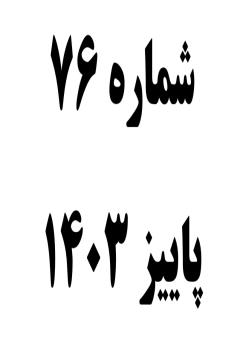Analyzing the role of women in the political-social developments of the Qajar era
Subject Areas : Epistemological and methodological researcher of historical research
mohammad esmaeili
1
,
Abulhasan Mobayyen
2
,
Omid Sepehri Rad
3
![]()
1 - PhD student of History of Iran after Islam, Department of History, Bojnord Branch, Islamic Azad University, Bojnord, Iran
2 - Department of History
Bojnord Islamic Azad university
3 - استادیار گروه تاریخ واحد بجنورد. دانشگاه آزاد اسلامی واحد بجنورد. ایران
Keywords: Women, Qajar era, political-social developments,
Abstract :
The socio-political situation of the Qajar era shows that women were present side by side with men in social and political activities all over the country and sometimes they were pioneers in some matters and were known as a motivating factor. Therefore, the purpose of the current research, which was carried out in a descriptive-analytical manner, is to analyze the role of women in the political-social developments of the Qajar era. The results of the present research show that women as one of the main poles of the Qajar government have been influential in many political and social developments that took place during the Qajar period, including the bread riot, tobacco embargo, and the fight against the sale of girls in the period of Asif al-Dawlah. Babbit, the establishment of a school and the formation of special women's associations, the protest of Mashhad women pointed to the issue of addiction and the constitutional movement. Among the mentioned cases, women played a much more prominent role in the story of the bread riot and tobacco ban. The constitutional revolution is also one of the most important developments of the late Qajar period, which brought out many women from insiders and had a great impact on the growth of women's political and social participation.


